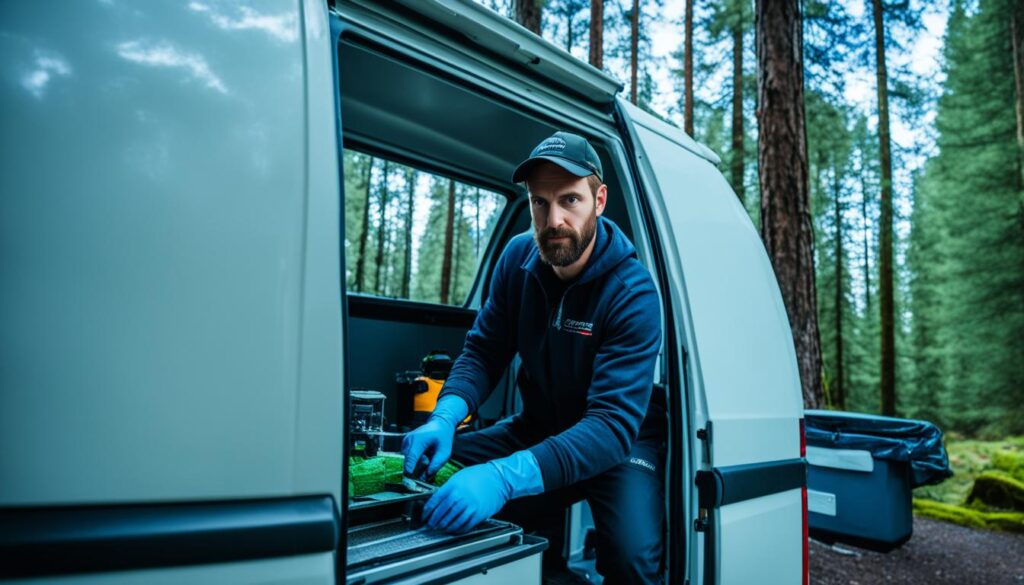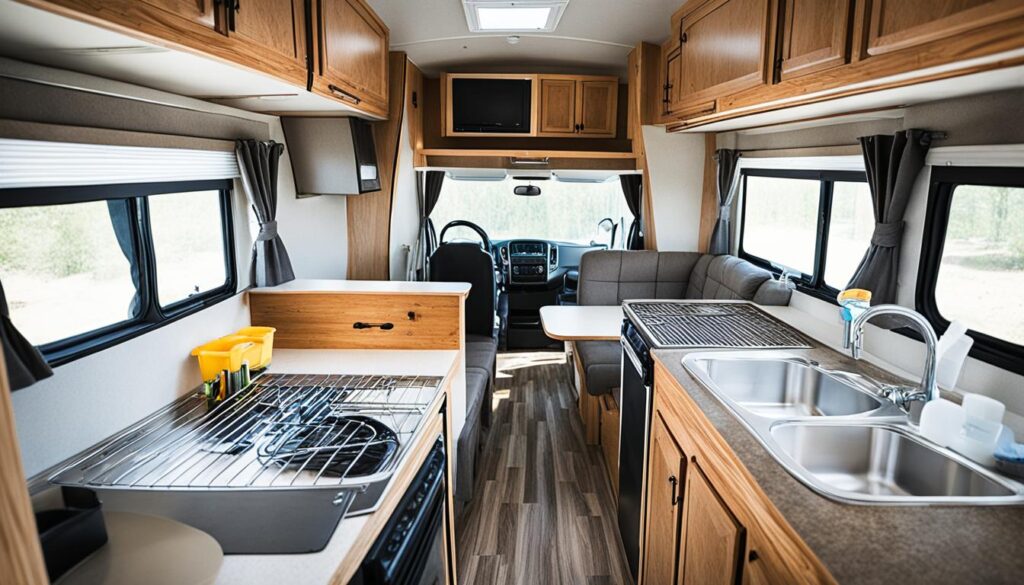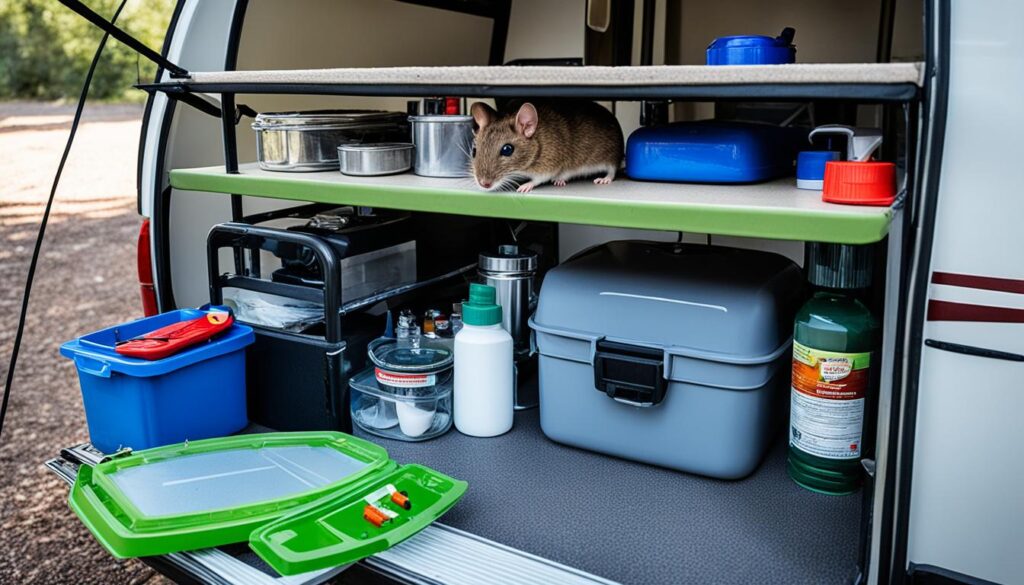Are you tired of finding mice in your camper, causing damage and potentially spreading diseases? It’s not just an annoyance, but a real concern for anyone who enjoys camping adventures. Understanding why mice are attracted to campers and knowing the signs of their presence is crucial for effective prevention. So, how can you keep mice out of your camper and ensure a rodent-free experience?
Key Takeaways:
- Inspect and seal potential entry points in your camper to create a strong barrier against mice.
- Use natural deterrents like peppermint oil-soaked cotton balls and dryer sheets to repel mice.
- Consider using electronic repellents that emit frequencies unpleasant to mice.
- Maintain a clean and mouse-proof RV by storing food properly and regularly cleaning to remove debris.
- Regularly inspect and maintain your camper to identify and address any potential entry points for mice.
Contents
Inspecting and Sealing Your Camper
To effectively keep mice out of your camper, it is crucial to thoroughly inspect and seal all potential entry points. Mice have the ability to squeeze through small holes, so it is important to examine both the interior and exterior of your camper in order to identify these access points.
Start by focusing on areas where wires, pipes, or other conduits pass through the design of your camper. These vulnerable points provide easy entry for mice. By sealing them with appropriate materials, such as spray foam, caulk, or copper mesh, you can create a strong barrier that will prevent mice from invading your camper.
Regular inspections and sealing of your camper are essential for maintaining its mouse-proof status. By staying vigilant and addressing potential entry points, you significantly reduce the risk of a mouse infestation, protecting your camper and ensuring a pest-free environment for your adventures.

In addition to inspecting and sealing your camper, there are other ways to effectively deter mice in your camper:
- Keep food and trash tightly sealed: Mice are attracted to easily accessible food sources. Store your food in airtight containers and keep your camper clean to minimize attractions.
- Eliminate potential nesting sites: Remove clutter and unnecessary items from your camper, reducing hiding spots and potential mouse nesting areas.
- Use mouse-repellent products: Consider using natural deterrents like peppermint oil-soaked cotton balls, dryer sheets, or Fresh Cab pouches in areas where mice are likely to enter.
Incorporating these mouse-deterrent techniques into your camper maintenance routine will help ensure a pest-free environment and protect your camper from potential damage caused by mice.
Using Deterrents and Repellents
In addition to inspecting and sealing your camper, using deterrents and repellents can be highly effective in preventing mice from infesting your camper. By incorporating these measures, you create a multi-layered defense against mice, further reducing the risk of an infestation.
Natural Deterrents
Natural deterrents are a popular and environmentally friendly method to keep mice away from your camper. These substances emit strong scents that repel mice and discourage them from entering your living space. Some effective natural deterrents include:
- Peppermint oil-soaked cotton balls: Place these cotton balls in areas where mice are likely to enter, such as storage compartments, vents, and corners. The strong smell of peppermint oil repels mice effectively.
- Dryer sheets: These household items contain strong scents that mice find displeasing. Keep them strategically placed throughout your camper to deter mice from entering.
- Fresh Cab pouches: These natural rodent repellent bags contain botanical ingredients that mice find offensive. Place them in areas prone to infestations, such as the engine compartment and storage compartments.
By using these natural deterrents, you can create an environment that mice will want to avoid, significantly reducing the chances of a mouse infestation in your camper.
Electronic Repellents
In addition to natural deterrents, electronic repellents can be an effective tool in keeping mice away from your camper. These devices emit high-frequency sounds that are unpleasant to mice, deterring them from entering and staying within your camper.
Electronic repellents come in various forms, including ultrasonic and electromagnetic devices. Ultrasonic repellents emit sound frequencies that are inaudible to humans but irritating to mice. Electromagnetic devices generate an electromagnetic field that creates an uncomfortable environment for mice.
When using electronic repellents, ensure that you follow the manufacturer’s instructions and place them strategically throughout your camper to maximize their effectiveness.
Combining Deterrents and Repellents
To create a comprehensive defense against mice infestations, it is recommended to combine both natural deterrents and electronic repellents. By utilizing multiple methods, you increase the effectiveness of preventing mice from entering your camper.
Implementing a combination of natural deterrents, such as peppermint oil-soaked cotton balls and Fresh Cab pouches, alongside electronic repellents, creates a powerful deterrent system that significantly reduces the likelihood of mice infesting your camper. By taking these preventative measures, you can enjoy a rodent-free camping experience.
Comparison of Deterrents and Repellents
| Deterrents | Pros | Cons |
|---|---|---|
| Peppermint oil-soaked cotton balls | – Environmentally friendly – Pleasant scent for humans – Effective in repelling mice | – Needs to be frequently replenished |
| Dryer sheets | – Easy to obtain – Versatile in placement – Affordable | – May lose effectiveness over time |
| Fresh Cab pouches | – Natural ingredients – Long-lasting effectiveness – Specifically designed for rodents | – Scent can be overpowering for humans if not properly placed |
| Electronic repellents | – No scent or residue – Long-lasting protection – Covers a larger area | – Different devices have varying effectiveness – Can be more expensive than natural deterrents |
Maintaining a Clean and Mouse-Proof RV
Maintaining a clean and mouse-proof RV is essential for keeping rodents away from your camper and safeguarding it from mice. Implementing proper cleaning and storage practices can significantly reduce the risk of a mouse infestation and the damage that comes with it.
Proper Food Storage
One of the key steps in mouse-proofing your camper is ensuring proper food storage. Use airtight containers to store all food items, including dry goods, snacks, and pet food. Mice are attracted to the smell of food, so keeping it tightly sealed will minimize their interest and deter them from entering your camper.
Regular Cleaning
Regularly cleaning your camper is crucial in eliminating food debris and potential nesting areas for mice. Sweep and vacuum the floors, wipe down countertops, and clean up any spills immediately. Pay extra attention to the kitchen area, as it tends to be a prime location for food crumbs and residues that can attract mice.
Storing Items Off the Ground
Mice can easily climb and jump, so storing items off the ground is an effective way to keep them away from your camper. Place camping gear, luggage, and other belongings on elevated surfaces, such as shelves or hanging racks. This reduces potential hiding spots for mice and makes it more difficult for them to access your belongings.
Routine Maintenance and Inspections
Regular maintenance and inspections of your camper can help identify and address any potential entry points for mice. Inspect the exterior of your RV for gaps, cracks, or holes that may serve as entryways. Seal these openings with appropriate materials, such as silicone caulk or expanding foam. Additionally, check the integrity of your camper’s seals, including windows, doors, and utility hookups, to ensure they are intact and free from gaps.
| Preventive Measures | Benefits |
|---|---|
| Proper food storage | – Minimizes food odors that attract mice – Reduces the risk of contamination and diseases |
| Regular cleaning | – Eliminates food debris and potential nesting areas – Creates an unattractive environment for mice |
| Storing items off the ground | – Reduces hiding spots for mice – Limits their access to your belongings |
| Routine maintenance and inspections | – Identifies and addresses potential entry points for mice – Ensures the integrity of your camper’s seals |
By following these steps and integrating them into your regular camping routine, you can maintain a clean and mouse-proof RV, safeguarding your camper from mice and creating a more enjoyable camping experience. Remember that prevention is key when it comes to keeping your camper free from rodents.

Conclusion
In conclusion, preventing mice from infesting your camper is essential to protect your vehicle from damage and ensure a healthy camping experience. By implementing a few key strategies, you can effectively keep mice out of your camper and enjoy rodent-free adventures.
First and foremost, understanding why mice are attracted to campers is crucial. With their warm and safe environment, campers become an enticing haven for mice seeking shelter and food. By addressing these needs through proactive measures, you can significantly reduce the risk of a mouse infestation.
Inspecting and sealing potential entry points is another critical step in mice prevention. Mice can squeeze through tiny gaps, so a thorough examination of both the interior and exterior of your camper is necessary. Seal any holes or gaps with materials like spray foam, caulk, or copper mesh to create a strong barrier against mice.
Using deterrents and repellents can further enhance your mice prevention efforts. Natural options like peppermint oil-soaked cotton balls, dryer sheets, and Fresh Cab pouches can repel mice due to their strong scents. Additionally, electronic repellents emit frequencies that are unpleasant to mice, adding an extra layer of defense.
Maintaining a clean and mouse-proof RV is vital for long-term prevention. Keep food stored in airtight containers, regularly clean to remove food debris, and store items off the ground to minimize the attractiveness of your camper to mice. Regular maintenance and inspections will also help identify and address any potential entry points.
With these mice prevention tips and practices in place, you can safeguard your camper from damage and reduce the risk of diseases spreading. By taking a proactive approach to mice infestation prevention, you can enjoy worry-free camping adventures in your rodent-free camper.
FAQ
Why are mice attracted to campers?
Mice are drawn to campers because they provide a warm and safe environment. Campers also offer potential food sources and hiding spots for mice.
What are the signs of a mouse infestation in a camper?
Signs of a mouse infestation in a camper include droppings, gnaw marks on wires or plumbing, and strange noises coming from within the camper.
How can I inspect and seal potential entry points in my camper?
Thoroughly inspect both the interior and exterior of your camper for any small holes or gaps. Pay attention to areas where conduits pass through the RV’s design. Use materials like spray foam, caulk, or copper mesh to seal these entry points.
What are some deterrents and repellents that can help keep mice away from my camper?
Natural deterrents such as peppermint oil-soaked cotton balls, dryer sheets, and Fresh Cab pouches can repel mice. Electronic repellents emit frequencies that are unpleasant to mice. Combining these methods creates a multi-layered defense against mice infestations.
How can I maintain a clean and mouse-proof RV?
Proper food storage in airtight containers, regular cleaning to remove food debris, and storing items off the ground can minimize the attractiveness of your camper to mice. Regular camper maintenance and inspections help identify and address potential entry points.






